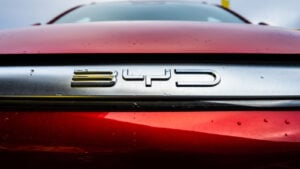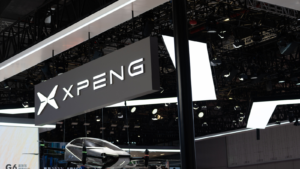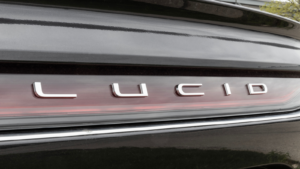Overall, I see that China will become a major player in the EV space, so investors should position their portfolios accordingly. This is because the country has been making a strategic shift from traditional industries like real estate towards high-value, technology-driven sectors, including electric vehicles.
Due to the credit crisis in the country, namely due to an unsustainable real estate industry that has historically fueled part of its GDP, China’s leadership is now eying growing its economy and workforce into a productive powerhouse. Selling Chinese cars to Chinese consumers is part of leadership’s goal, with excess production being shipped overseas.
So with this thesis in mind, here are seven EV stocks for consumers to consider, which rides on China’s growth strategy.
Li Auto (LI)

Li Auto (NASDAQ:LI) specializes in electric vehicles equipped with range extenders, mitigating range anxiety for customers.
In November 2023, LI delivered a record 41,030 units, as Investorplace.com reported, highlighting a 2.7 times increase from the previous year. This surge in deliveries, reaching 325,677 units for the cumulative year. It saw robust demand. for its premium SUVs such as the Li L9, Li L7, and Li L8. These models combine gasoline generators with batteries to extend their range.
Looking forward to 2024, LI plans to maintain its significant presence in the EV market by launching three all-electric models based on a high-voltage platform in the second half of the year. Additionally, the early launch of the Li L6, a five-seat EREV SUV, originally scheduled for June, has been moved up to this month to compete directly with offerings from other manufacturers.
LI has set an ambitious sales target of 800,000 units for 2024, aiming for the Li L6 to achieve monthly sales of 30,000 units.
BYD (BYDDY)

BYD Company (OTCMKTS:BYDDY) operates across electric cars, electronics, and energy industries.
I’m the most bullish on BYDDY out of all of these companies on this list. The reason being is that there is a high amount of Chinese consumption for BYDDY’s line of vehicles, with 90 percent being sold domestically in China.
However, there’s more to the story. In 2023, BYD achieved significant growth, concluding the year with a record 3 million annual sales and becoming the global leader in new energy vehicle (NEV) sales for the second consecutive year. This achievement also marked BYD’s entry among the global top 10 car sales for the first time.
BYD’s product range, including the Dynasty and Ocean series, DENZA, FANGCHENGBAO, and YANGWANG, contributed to a 61.9% surge in sales compared to the previous year.
BYDDY is helping to lower the average of cost EV’s across the board with its mid-market offerings, which positions it uniquely in the market against competitors like Tesla (NASDAQ:TSLA), especially in markets outside the U.S. where BYD has a significant presence €‹.
Nio (NIO)

Nio (NYSE:NIO) produces premium electric cars and is known for technologies such as autonomous driving and battery swapping. NIO is still a buy for me, despite revising its guidance for delivery numbers downwards this year.
For 2024, NIO aims for sales forecasts exceeding 230,000 units. The introduction of the Alps model, based on the NT 3.0 platform, is anticipated in the second half of 2024.
While BYDDY may cater to the mid-market, NIO competes more closely within Tesla’s waters in the luxury and high-end segment. However, as in the case with the majority of the Chinese EV stocks on this list, NIO will compete mostly with other Chinese companies and within the East Asia geographical area in general.
Still, NIO’s progress is built on a solid foundation. In 2023, NIO achieved a significant growth milestone, delivering 160,038 vehicles, marking a 30.7% year-over-year increase. This performance contributed to a cumulative delivery of 449,594 vehicles by the end of December 2023.
XPeng (XPEV)

XPeng (NYSE:XPEV) offers smart electric vehicles and has gained attention for its advanced EVs. I like XPEV because it plans to invest significantly in artificial intelligence (AI) for intelligent driving and aims to launch around 30 new or revised products over the next three years.
XPEV is establishing itself firmly in the domain of “smart EVs” for Chinese consumers, and some of its models have attracted attention from investors and car enthusiasts overseas as well.
I also think that XPEV stock is a somewhat underappreciated name for investors interested in Chinese EVs. The company has launched the X9 Ultra Smart Large Seven-Seater in China, which has many auto magazines and podcasts excited. Financially, XPeng is working towards achieving breakeven by 2026, indicating a focus on improving profitability in the coming years.
Analysts have a mixed outlook on XPeng, with a recent price target set by Morgan Stanley at $18, suggesting a substantial upside from its current closing price.
Rivian (RIVN)

Rivian (NASDAQ:RIVN), an American electric vehicle automaker, is the first non-Chinese stock on this list that I feel has great potential for investors.
I chose RIVN because it reported its Q1 2024 production and delivery totals, indicating that it produced 13,980 vehicles and delivered 13,588 during the period. This performance was consistent with the company’s expectations. Looking ahead, RIVN has reaffirmed its 2024 guidance, planning to produce a total of 57,000 vehicles for the year.
Additionally, RIVN has projected an adjusted EBITDA loss of $2.7 billion for 2024 and announced plans to reduce its salaried workforce by approximately 10% to further improve cost efficiency.
It may sound strange, but I love it when a company chooses to trim the fat off their operations, which often comes in the form of layoffs. A smaller business is generally more internally efficient, and the reduced headcount means there’s less salaries to pay and stock-based compensation to dilute shareholders.
Trading at just 2.3 times sales, RIVN is one of those EV stocks for investors to consider if they want to stick with American made.
Lucid Group (LCID)

Lucid Group (NASDAQ:LCID) produces luxury electric vehicles and operates North America’s first purpose-built, greenfield EV factory.
LCID is my contrarian pick of these EV stocks to buy. The risks of investing in LCID is substantial, but the counterfactual is that the brand’s valuation is very cheap in my view. LCID plans to manufacture only 9,000 electric vehicles (EVs) in 2024, a stark reduction from its earlier forecast of 90,000 EVs.
Framing the company’s issues is this: In 2023, LCID faced a $2.8 billion loss, prompting a price reduction of its Air sedan by $8,000 in an effort to boost sales. However, the introduction of the Gravity SUV, slated for production in late 2024, could be a catalyst for growth that the company desperately needs.
Not all the news is bad though. In 2023, LCID delivered 6,001 vehicles, marking a 37% increase compared to 2022. Its production figures for the same year stood at 8,428 vehicles. The stock is also down 73.61% over the past five years, so there’s plenty of room for a potential recovery.
Tesla (TSLA)

Tesla (NASDAQ:TSLA) is, and perhaps always will be one of my top EV stocks. It’s largely a barometer for the entire industry, especially for investors and consumers who prefer premium, American-made vehicles.
The company has planned to increase its capital expenditure to over $10 billion for the year. This investment is aimed at bridging the gap between its first major growth wave, marked by the ramp-up of Model 3 and Model Y production, and the next anticipated growth wave, expected to begin with the ramp-up of next-generation vehicles in late 2025.
However, Tesla’s Q1 2024 performance indicated challenges with an 8.5% year-over-year decline in vehicle deliveries, attributed to production ramp-up phases and unexpected factory shutdowns. This decline represents Tesla’s first such decrease since the second quarter of 2020 €‹.
The silver lining though is that I believe that TSLA is undergoing a contractive phase before springing back to life, like momentum stored in a coiled spring. Its valuation has also improved, with its stock price near a one-year low, and its issues I believe are cyclical rather than structural, which could mean it’s a great opportunity for investors to hop on board TSLA now.
On the date of publication, Matthew Farley did not have (either directly or indirectly) any positions in the securities mentioned in this article. The opinions expressed are those of the writer, subject to the InvestorPlace.com Publishing Guidelines.
Matthew started writing coverage of the financial markets during the crypto boom of 2017 and was also a team member of several fintech startups. He then started writing about Australian and U.S. equities for various publications. His work has appeared in MarketBeat, FXStreet, Cryptoslate, Seeking Alpha, and the New Scientist magazine, among others.
